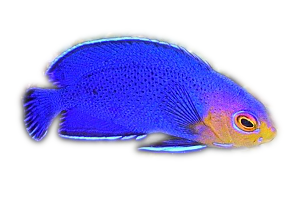
By Bob Goemans

Likely Reef Tank Suitable
Likely Fish-Only Tank Suitable
Range: Indo-West Pacific Ocean: Red Sea east to Indonesia then to Samoa, north to the Philippines and Micronesia, and south to the Great Barrier Reef.
Size: 3 inches (9 cm)
Natural Environment: Inhabits coastal coral reefs and often hides among soft corals and macroalgae and usually found at depths between 6 – 200 feet (2 – 60 m) where it feeds on small benthic invertebrates.
General Husbandry: Occasionally seen in the trade with this highly secretive species having a mottled reddish orange body with a white line from the snout to just past the gill plate. Males and females are similarly colored.
Can be maintained with peaceful slightly larger tankmates in reef or fish-only aquariums having rocky crevices and caves to hunt and hide in. Will search bottom areas for tasty bottom dwelling invertebrates, e.g., shrimp and worms.
As to diet, will eat most regular aquarium foods, e.g., finely chopped various frozen or fresh meaty foods such as mysis, squid, fish flesh, shrimp, clam, etc., and should be fed twice daily.
May be difficult to get feeding in the beginning, and if so, try some live foods, such as black worms (Lumbriculus variegatus), adult fortified brine shrimp and/or grass/ghost/glass shrimp.
Taxonomy:
Order: Perciformes
Suborder: Labroidei
Family: Labridae
Genus: Pteragogus
FYI: Smaller tankmates are at risk of being harassed or eaten as this species grows to adulthood.
One per aquarium.
Experience Level: Intermediate
Temperament: Semi-aggressive
Diet: Carnivore
Coral Safe: Yes
Fish Safe: With caution
Invertebrate Safe: With caution
Acclimation Time: 30 minutes+
Aquarium Environment: Reef or fish-only aquarium
Tankmates: Peaceful, yet larger
Minimum Tank Size: 50 gallons
Temperature Range: 74 - 82°F (23 – 27°C)
Specific Gravity: 1.020 - 1.026
pH: 8.0 - 8.5
.jpg)